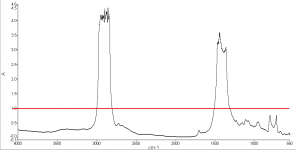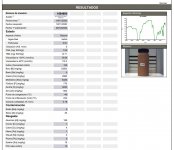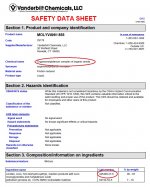You are using an out of date browser. It may not display this or other websites correctly.
You should upgrade or use an alternative browser.
You should upgrade or use an alternative browser.
Ceratec and Mos2 Discussion
- Thread starter DV0993
- Start date
DV0993
Thread starter
It is probably somewhere between 30-50ml. Confirmed it is a beater, though!Hopefully that mower is a beater. 50ml is a lot.
@Trav showed what happened in a splash lubed air compressor with Ceratec added to the oil. The stuff settled at the bottom of the oil sump and remained there. So if the mower sits for long periods of time my guess would be the same thing will happen. Flame suit on......Hopefully that mower is a beater. 50ml is a lot.
MolaKule
Staff member
Moly is already in motor oils as MoDTC as well as a form of a ceramic compound called Boron ester. Both are soluble and don't leave particles sitting in the sump.Reviving an old topic perhaps.
I was having a discussion with some friends. We all swear by Mos2 and use it in our mowers, daily drives and sports cars. I personally have noticed an improvement in smoothness and fuel consumption by using mos2.
Keen to hear everyones experiences.
Anyhow, my friend's mechanic mentioned that Ceratec is better for alloy blocks, whilst mos2 is better for cast iron blocks? Is there any validity to this statement?
For the record, I add half a bottle to my s2000 (but only when im not using a group IV oil) and half a bottle to my diamante (which uses conventional).
Good morning, I write from Spain.
A few weeks ago I had the Liqui Moly Ceratec analyzed and here I leave the results.
Apparently currently (I do not know in the past) it does not use MOS2 but organic molybdenum.
Everything indicates that the base used, depending on the spectroscopy and the flash and freezing points, is HC base
A few weeks ago I had the Liqui Moly Ceratec analyzed and here I leave the results.
Apparently currently (I do not know in the past) it does not use MOS2 but organic molybdenum.
Everything indicates that the base used, depending on the spectroscopy and the flash and freezing points, is HC base
Attachments
Thank you for the analysis Arrechera
MolaKule
Staff member
On the left Graph - is this the full spectra of Moly Ceratec (I have my doubts)? The only way to prove that the VanderbiltGood morning, I write from Spain.
A few weeks ago I had the Liqui Moly Ceratec analyzed and here I leave the results.
Apparently currently (I do not know in the past) it does not use MOS2 but organic molybdenum.
Everything indicates that the base used, depending on the spectroscopy and the flash and freezing points, is HC base
ester- moly is the same component in Moly Ceratec is to have a separate spectrum analysis of the Vanderbilt
ester- moly alone and then compare that graph to the full spectra of Moly Ceratec.
Last edited:
DV0993
Thread starter
Update: K24 accord euro with approx 168500km on the clock and 1500km into 5w30 Shell Helix Ultra dosed with LM Ceratec ->
I noticed an improvement in smoothness and response at around the 800km mark.
The car definitely pulls harder and seems happier at higher revs.
In terms of fuel economy, I calculate a 4% improvement.
Worth it? Yes - Will use again.
I noticed an improvement in smoothness and response at around the 800km mark.
The car definitely pulls harder and seems happier at higher revs.
In terms of fuel economy, I calculate a 4% improvement.
Worth it? Yes - Will use again.
Hi, I am not confirming that it is exactly the molybdenum model, but the CAS does match.On the left Graph - is this the full spectra of Moly Ceratec (I have my doubts)? The only way to prove that the Vanderbilt
ester- moly is the same component in Moly Ceratec is to have a separate spectrum analysis of Moly Ceratec alone and then compare that graph to the full spectra of Moly Ceratec.
Regarding spectroscopy, it corresponds to Liqui Moly Ceratec
I will used oem or wix or wix xp which less micron rating then ultra which might be clogged with ceratec that my 2 cents
I used Ceratec last year after reading about it for years as I just wanted to try it. I used it with Mobil One and a Fram Ultra and my experience was different than most I'm not exactly sure why tho. When I originally added the product I did not notice anything different at all, around the 1k-2k mark my motor was noticeably louder than any prior time in history no placebo it was much louder even my wife commented on how loud it was.
I don't know exact what caused it as I've not read any experiences similar to this but after 3k total miles I drained it and put used a new filter and replaced the oil. At first it was back to normal but 500-ish miles in the noise returned and stayed until I trained that oil and replaced the filter again at about 2k miles.
This car has always been very quiet, however it was loud at roughly 3k rpm and sounded like a tick/knock just very difficult to miss. This is coming from a vehicle which is hardly audible at idle outside of the vehicle. After the second change the noise has gone away and not returned I drove the vehicle to North Dakota and back to Mississippi and it ran quietly and perfectly fine.
I don't want to blame the loud tick/knock sound on Ceratec but it's never made any noise like that in the 5 years I've owned it and after the Ceratec drain and the change after that it went away and has returned to normal.
[/QUOTE
All due to an additive. Amazing.Update: K24 accord euro with approx 168500km on the clock and 1500km into 5w30 Shell Helix Ultra dosed with LM Ceratec ->
I noticed an improvement in smoothness and response at around the 800km mark.
The car definitely pulls harder and seems happier at higher revs.
In terms of fuel economy, I calculate a 4% improvement.
Worth it? Yes - Will use again.
Here's a UOA of my f30 BMW with 6% ceratec and SHU 5w40
6500km (4000mi) oil change consisting of mainly urban driving and 3 track sessions
I've always been a bit of a sceptic when I comes to oil additives which is why I went ahead with this UOA. Can't comment of increased mileage, my driving habits are quite erratic, but for the 2000kms the engine felt marginally smoother... Dunno if it stopped working after that or I just got used to it

6500km (4000mi) oil change consisting of mainly urban driving and 3 track sessions
I've always been a bit of a sceptic when I comes to oil additives which is why I went ahead with this UOA. Can't comment of increased mileage, my driving habits are quite erratic, but for the 2000kms the engine felt marginally smoother... Dunno if it stopped working after that or I just got used to it
So what do you compare this against?Here's a UOA of my f30 BMW with 6% ceratec and SHU 5w40
6500km (4000mi) oil change consisting of mainly urban driving and 3 track sessions
I've always been a bit of a sceptic when I comes to oil additives which is why I went ahead with this UOA. Can't comment of increased mileage, my driving habits are quite erratic, but for the 2000kms the engine felt marginally smoother... Dunno if it stopped working after that or I just got used to it
View attachment 39631
I also noticed the same - not quite 4% for me more like 2-3%.Update: K24 accord euro with approx 168500km on the clock and 1500km into 5w30 Shell Helix Ultra dosed with LM Ceratec ->
I noticed an improvement in smoothness and response at around the 800km mark.
The car definitely pulls harder and seems happier at higher revs.
In terms of fuel economy, I calculate a 4% improvement.
Worth it? Yes - Will use again.
But the smoothness and pulling harder I noticed.
Its a 2.0turbo engine that I used it in.
Hyundai - - - I was trying to add some protection to a would be troublesome motor. ThetaII
Considering that the gasoline itself (even when purchased at the same station) can vary in energy density by up to 4%, it would be an insurmountable task to attribute any change in fuel economy to the additive.I also noticed the same - not quite 4% for me more like 2-3%.
But the smoothness and pulling harder I noticed.
Its a 2.0turbo engine that I used it in.
Hyundai - - - I was trying to add some protection to a would be troublesome motor. ThetaII
As for "pulling harder" well, that's another thing.
I think if there were really a 4% or even a 1% fuel economy increase, that the oem manufacturers would be all over that.
Agreed. I will contend that folks aren't collecting enough data to actually know what mpgs they get normally over time let alone after an additive. I've tracked my mpgs for 2 years/50K miles using Fuelly over a full compliment of upgrades, oil changes, additives, different spark plugs, air filters, etc. and only see a small drop for the larger turbo/tune I run now over that time. There is no way Ceratec is giving you that much of a bump. I used it and any variability I saw was within the normal variation you see.
Well if you did not get a bump then it must be true that someone else on the planet could not achieve such feat.Agreed. I will contend that folks aren't collecting enough data to actually know what mpgs they get normally over time let alone after an additive. I've tracked my mpgs for 2 years/50K miles using Fuelly over a full compliment of upgrades, oil changes, additives, different spark plugs, air filters, etc. and only see a small drop for the larger turbo/tune I run now over that time. There is no way Ceratec is giving you that much of a bump. I used it and any variability I saw was within the normal variation you see.
If TiGeo can't us mere mortals should not even bother.
Contend that most folks aren't collecting enough data - patronize much.
It's simple math man - - - easy to calculate.
My data was taken over 1 year of use before ceratec and 1 year after......I drive the same route every day, no deviation.
Properly maintain my vehicle - fill up at the same pump.
Take er easy.
I am not the only person here that thinks this is fishy and posts where people claim large (relatively speaking) mpg increases from additives, brand XYZ oil, and mods are a consistent thing on forums and social media, almost 100% of the time with no substantiated data to back them which is the basis for my comments. If you collected the data and saw an improvement, great and I'm wrong, not really a big deal. I'd love to see your tabulated data b/c that's v. impressive for an additive and as mentioned above, surprising if friction modifiers like Ceratec could do this manufacturers haven't jumped all-in on it.Well if you did not get a bump then it must be true that someone else on the planet could not achieve such feat.
If TiGeo can't us mere mortals should not even bother.
Contend that most folks aren't collecting enough data - patronize much.
It's simple math man - - - easy to calculate.
My data was taken over 1 year of use before ceratec and 1 year after......I drive the same route every day, no deviation.
Properly maintain my vehicle - fill up at the same pump.
Take er easy.
The data would be irrelevant since it is impossible to attribute such a change solely to one isolated variable in everyday driving. There are myriads of uncontrolled variables in such driving even if one is convinced they are controlling them, which they are not. Many environmental and societal changes affect fuel economy and none of them are strictly controlled. Even the normal variation in fuel energy density I mentioned above wipes out most people's perceived improvements.
Everyone focuses on the change they see (which can be measured) but the problem comes in when attempting to ascribe it to one variable. This is often grossly misunderstood but is the real issue.
Everyone focuses on the change they see (which can be measured) but the problem comes in when attempting to ascribe it to one variable. This is often grossly misunderstood but is the real issue.
Similar threads
- Replies
- 7
- Views
- 3K
- Replies
- 12
- Views
- 1K
- Replies
- 20
- Views
- 912
- Replies
- 20
- Views
- 4K
- Locked
- Replies
- 6
- Views
- 6K




